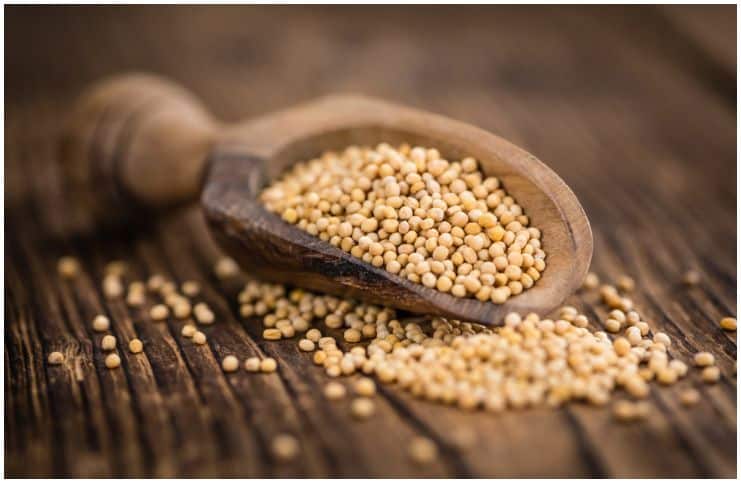Pickled Mustard Seeds (Black, Brown, Yellow) – Side Effects & Health Benefits:
Mustard seeds are from the mustard plant (Brassica oleracea family), which is a cruciferous vegetable related to Brussels sprouts, kale, broccoli, radishes, and cabbage.
The English word ”mustard” is derived from the Latin words ”mustum ardens” literally translating “burning must,” describing the famous grape wine that was combined with ground mustard seeds.
Moreover, an archaic name for the seed is ”eye of newt.” Frequently misinterpreted for the actual eye of a newt, this ancient name of the plant has been popularly linked with witchcraft ever since it was mentioned as an ingredient to a witch’s brew in Shakespeare’s popular play Macbeth.
Mustard seeds are mentioned in the New Testament in which the kingdom of Heaven is compared to a grain of mustard seed. Furthermore, these seeds are also mentioned in ancient Sanskrit writings dating back about 5,000 years ago.
There are three types:
- white mustard (Brassica alba – these seeds are light straw-yellow colored and are slightly larger than the other 2 varieties);
- black mustard (Brassica nigra – these seeds are sharp and more pungent than the other 2 varieties);
- brown mustard (Brassica juncea – these seeds are native to the sub-Himalayan plains of Northern India).
Nutrition facts
They are an important source of vitamins B1, B3, B6, C, E, and K, and minerals such as – phosphorus, calcium, manganese, selenium, magnesium, copper, iron, and zinc. Along with this, they are a good source of dietary fiber, folate, kaempferol (anti-inflammatory, antioxidant, antimicrobial, cardioprotective, and neuroprotective effects), quercetin (free radical fighter), beta carotene (which stimulates hair growth). Also, mustard seeds don’t contain LDL cholesterol.
Health benefits of pickled mustard seeds
Omega-3 fatty acids
The seeds represent an important source of omega-3 fatty acids. A study at the University of Pittsburgh concluded that young, healthy adults who increased their intake of omega-3s considerably increased their working memory.
Cancer prevention
The presence of substances like glucosinolates and myrosinase (a family of enzymes involved in plant defense against herbivores) in these amazing seeds are known to use phytochemicals to inhibit the growth of cancer cells.
According to a 2005 study at Radiation and Cancer Biology Laboratory, New Delhi, India the seeds have the capacity to enhance the antioxidant defense system, providing protection against the toxic effects of carcinogens.
Muscle pain relief
The medical term for muscle pain is myalgia. Stiff muscles or aching and sore muscles can be treated with these seeds too. Just soak yourself in a tub of warm water. Now add some seed powder in the water to relieve the pain.
Antioxidant properties
They contain the amino acid – cysteine, which acts as an antioxidant in your body. Cysteine protects your body from free radicals (they are generated when toxins are broken down in the body), which are harmful substances in your body that damage DNA and cell membranes.
Asthma
These seeds are known to be beneficial for asthma patients. The typical asthma symptoms include – cough, wheezing, chest tightness, and shortness of breath.
The presence of minerals like magnesium, copper, iron, and selenium in the seeds is responsible for the prevention of asthma attacks.
They reduce LDL cholesterol
They have a powerful cholesterol-lowering capacity, courtesy of their ability to bind bile acids. Bile acids are composed of cholesterol, so this binding activity helps reduce your LDL (the bad one) cholesterol level by boosting excretion.
Contact dermatitis
The seeds offer therapeutic relief for contact dermatitis. This condition appears when foreign compounds or excess exposure to water makes your skin red, itchy and inflamed.
Studies have suggested that consumption of these seeds helps in healing the symptoms connected with contact dermatitis, such as a reduction in the ear swelling and healing of tissues.
Side effects of mustard seeds
Consumption of large amounts of mustard seeds may cause bleeding from the stomach, gastric irritation, and intestinal mucosa.
Additionally, it may cause skin burn when applied on the skin for a longer time. Erucic acid (monounsaturated long-chain fatty acid) in the seeds has been found to have possible carcinogenic and genotoxic effects in laboratory animal studies.
More importantly, uncooked leaves and seeds from this plant contain a compound named goitrogens, which might mess up the functioning of the thyroid gland.
Individuals already suffering from thyroid dysfunction should always cook the plant prior to consumption to neutralize these active substances.
Recipe
Ingredients
- 1 cup mustard seeds;
- 3/4 cup water;
- 1 cup rice wine vinegar;
- 1/2 cup sugar;
- 1 teaspoon turmeric;
- 1 tablespoon salt.
Method
Mix all ingredients together in a small saucepan and bring to a gentle simmer over low heat. Cook until the mustard seeds are plump and tender (about 60 minutes).
Also, if too much liquid evaporates, add just enough water to cover the seeds. They may be stored, covered, and refrigerated for up to one month.
How to store
- store it in an air-tight container so that it is sealed properly;
- always store the seeds in a cool place;
- the container must be completely dry;
- whole seeds can last up to 1 year, and ground or powdered ones last as long as 6 months;
- the shelf where you place the container should not be moist.
READ THIS NEXT:
Fenugreek: Side Effects & Health Benefits for Skin and Hair
Pokeberry – Side Effects & Health Benefits
Hyacinth Beans (Lablab Purpureus) – Side Effects
References https://www.ncbi.nlm.nih.gov/pubmed/16004197 https://www.ncbi.nlm.nih.gov/pubmed/20889681


